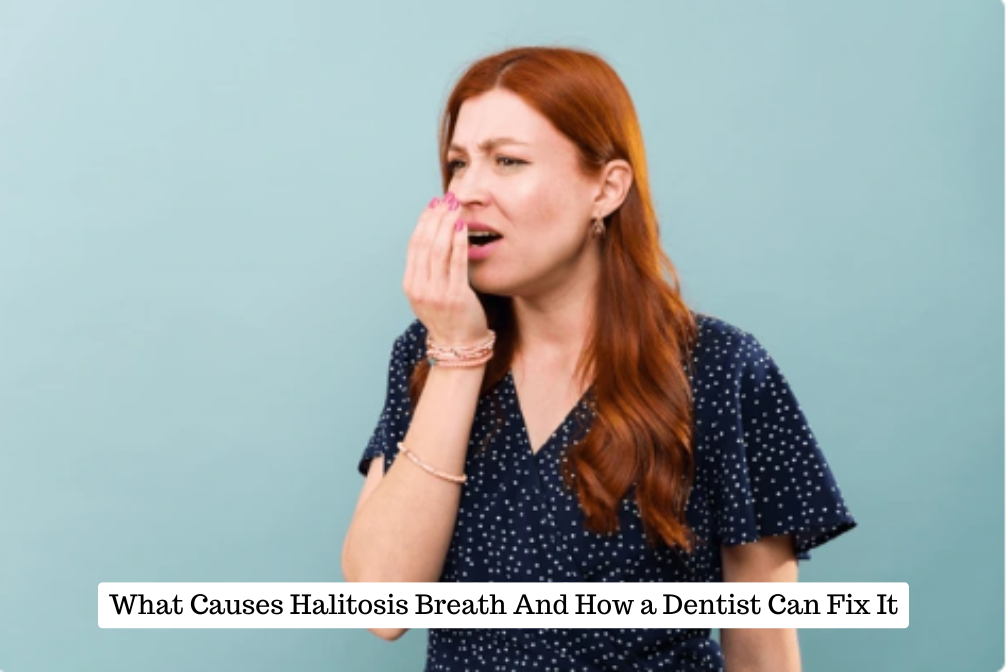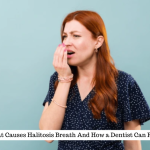What Causes Halitosis Breath And How a Dentist Can Fix It
Did you know that 25% of adults suffer from chronic bad breath? Halitosis can be embarrassing and affect your social life, but dentistry offers effective solutions. This article explores how dental treatments, including teeth cleaning and oral hygiene therapy, can combat halitosis. We'll discuss common causes of bad breath, such as bacteria buildup, and provide practical tips for maintaining fresh breath. Learn how regular dental visits and proper oral care can help you overcome persistent halitosis and boost your confidence.
Key Takeaways
- Regular brushing, flossing, and tongue cleaning are essential for preventing halitosis and maintaining fresh breath
- Professional dental cleanings and check-ups help detect and address underlying causes of bad breath
- Treating gum disease and restoring decayed teeth are crucial steps in alleviating persistent halitosis
- Antimicrobial mouthwashes and proper hydration play important roles in reducing bacteria that cause bad breath
- Medical conditions and certain medications can contribute to halitosis, requiring professional dental intervention for effective treatment
Understand Common Causes of Halitosis and Dental Solutions
Understanding the common causes of halitosis is crucial for effective treatment. This section explores oral hygiene factors and medical conditions linked to bad breath. Factors such as poor dental care, certain medications, blood disorders, tooth loss, diet, and smoking can contribute to halitosis. Recognizing these causes enables dentists at Ocean Dental Associates in Ocean Township to provide targeted solutions for fresher breath. Meet Our Dental Team
Recognize Oral Hygiene Factors Contributing to Bad Breath
Poor oral hygiene stands as a primary factor contributing to bad breath. When individuals neglect to brush their teeth regularly or fail to clean their tongue, bacteria accumulate in the mouth, leading to unpleasant odors. These bacteria can also cause gingivitis and periodontal disease, which further exacerbate halitosis. Additionally, issues in the respiratory tract, such as tonsil stones or sinus infections, can result in persistent bad breath that requires professional dental intervention
Identify Medical Conditions Linked to Halitosis
Various medical conditions can contribute to halitosis, requiring dental intervention for effective treatment. Gastroesophageal reflux disease (GERD) can cause stomach acid to flow back into the esophagus, leading to bad breath. Dietary factors, such as excessive sugar consumption, can promote bacterial growth in the mouth, exacerbating halitosis. Proper oral hygiene, including regular brushing with fluoride toothpaste and flossing, helps combat these issues. In some cases, dental procedures like crown placement may be necessary to address underlying tooth decay or damage that contributes to persistent bad breath.
Learn Effective Dental Treatments for Bad Breath
Effective dental treatments for bad breath include professional teeth cleaning and tongue cleaning. These methods target bacterial build-up, a common cause of halitosis. Dentists may also address underlying issues like tooth decay or gum disease, which can contribute to persistent bad breath. Treatment plans often incorporate fluoride applications and may consider factors such as candy consumption, heartburn, and root health.
Utilize Professional Teeth Cleaning for Fresh Breath
Professional teeth cleaning plays a crucial role in combating halitosis and promoting fresh breath. During this procedure, dental professionals remove plaque and tartar buildup that regular brushing and dental floss may miss, addressing potential sources of bad odor. For patients with bruxism, teeth cleaning can also help prevent complications that may lead to tooth decay or the need for root canal surgery. By thoroughly cleaning hard-to-reach areas, dentists eliminate bacteria that contribute to bad breath, providing patients with a cleaner, fresher mouth.
Consider Tongue Cleaning to Reduce Bacterial Build-Up
Tongue cleaning serves as an essential component in reducing bacterial build-up and combating halitosis. Dentists often recommend using a tongue scraper or brush to remove the layer of mucus and debris that accumulates on the tongue's surface, which can harbor odor-causing bacteria. This practice, combined with regular use of an antimicrobial mouthwash, can significantly improve breath freshness. For patients with dental implants or those undergoing treatment for conditions like kidney failure, tongue cleaning becomes even more crucial in maintaining overall oral health and preventing complications such as foreign body reactions.
Improve Oral Hygiene Habits to Prevent Halitosis
Improving oral hygiene habits is crucial for preventing halitosis. Regular brushing and flossing are essential for optimal oral health, while antimicrobial mouthwashes help eliminate bacteria. Proper oral care can combat bad breath caused by onion consumption, alcohol use, and periodontal issues. Cosmetic dentistry and periodontology offer advanced solutions for persistent halitosis, complementing daily chewing habits and hygiene routines.
Brush and Floss Regularly for Optimal Oral Health
Regular brushing and flossing are essential for optimal oral health and preventing halitosis. These practices remove food particles and bacteria that can lead to sulfur-producing compounds, which cause bad breath. Dentists recommend brushing twice daily with fluoride toothpaste and flossing at least once a day to combat general oral diseases and maintain a fresh taste in the mouth. Additionally, staying hydrated by drinking water throughout the day helps wash away bacteria and food debris, further reducing the risk of halitosis:
Use Antimicrobial Mouthwashes to Eliminate Bacteria
Antimicrobial mouthwashes play a crucial role in eliminating bacteria that cause halitosis. These rinses target harmful microorganisms on the tongue and throughout the oral cavity, complementing regular brushing and flossing. Dentists often recommend using a tongue cleaner in conjunction with mouthwash for optimal results. During a physical examination, dental professionals may suggest specific mouthwash formulations tailored to address individual breath conditions, particularly for patients who have undergone root canal treatment or experience chronic breathing issues.
Seek Dental Advice for Persistent Bad Breath Issues
Persistent bad breath issues often indicate underlying dental or health problems. Regular dental checkups help identify causes like infections or diabetes. Dentists can recommend tailored treatments, including strategies for pain management and addressing conditions like liver disease. Professional advice is crucial for effectively managing halitosis, with options ranging from specialized oral care to addressing systemic health concerns.
Schedule Dental Checkups to Identify Underlying Causes
Regular dental checkups play a crucial role in identifying underlying causes of persistent bad breath. Dentists can detect issues like calculus buildup and inflammation, which may contribute to halitosis. During these visits, professionals assess oral health, including proper water intake and potential signs of kidney disease. The American Dental Association recommends biannual checkups for optimal oral health maintenance and early detection of breath-related issues:
Discuss Treatment Options With Your Dentist
Discussing treatment options with a dentist is crucial for addressing persistent bad breath issues. Dentists can offer personalized solutions, considering factors like garlic consumption and overall oral hygiene practices. They may recommend specific toothbrush techniques or advanced cleaning methods to combat halitosis. Additionally, dentists can address underlying health concerns, such as toothaches, that might contribute to breath problems, ensuring comprehensive oral health care.
Address Underlying Dental Problems Causing Halitosis
Addressing underlying dental problems is crucial for treating halitosis. This section explores how treating gum disease and restoring decayed teeth can alleviate bad breath. Dentists focus on issues affecting the gums, throat, and tonsils, while considering conditions like xerostomia. Orthodontic treatments may also play a role in combating persistent breath issues.
Treat Gum Disease to Alleviate Bad Breath
Treating gum disease is essential for alleviating bad breath and improving overall oral health. During a comprehensive dental exam, dentists assess the mouth for signs of periodontal issues that can contribute to halitosis. Treatment may involve deep cleaning procedures, such as scaling and root planing, to remove bacteria-harboring plaque and tartar. In some cases, dentists might recommend probiotic supplements to promote healthy oral bacteria balance and support salivary gland function. By addressing gum disease, patients can experience significant improvements in their breath and overall oral health:
- Comprehensive dental exam to identify gum disease
- Deep cleaning procedures to remove plaque and tartar
- Probiotic supplements to promote oral bacteria balance
- Salivary gland function support for better breath
Restore Decayed Teeth to Reduce Odor
Restoring decayed teeth plays a crucial role in reducing oral odor and improving overall dental health. Dentists address tooth decay through various treatments, including fillings, crowns, or in severe cases, dentures. These interventions not only eliminate the source of bad breath but also prevent further decay and potential complications such as oral cancer. For patients with allergies to certain dental materials, dentists can offer alternative solutions to ensure effective treatment while minimizing allergic reactions. Proper restoration of decayed teeth helps maintain a healthy oral environment, reducing bacteria that contribute to unpleasant odors:
- Fillings for minor tooth decay
- Crowns for severely damaged teeth
- Dentures for extensive tooth loss
- Allergy-friendly dental materials
- Regular check-ups for early detection of oral cancer
Maintain Regular Dental Visits for Ongoing Fresh Breath
Regular dental visits are crucial for maintaining fresh breath and preventing halitosis. Establishing a routine for professional cleanings allows dentists to monitor oral health changes, addressing issues in the gastrointestinal tract and tissues. These visits help reduce the risk of developing severe breath conditions, with procedures like scaling and root planing effectively combating persistent halitosis. The Mayo Clinic recommends consistent dental check-ups for optimal oral health maintenance.
Establish a Routine for Professional Dental Cleanings
Establishing a routine for professional dental cleanings is essential for maintaining fresh breath and preventing halitosis. Regular cleanings remove debris and plaque that can contribute to bad breath, including those caused by stomach issues or sinusitis. Dentists recommend scheduling cleanings every six months to effectively manage oral health and address potential bridge-related problems. These visits allow professionals to detect and treat early signs of conditions that may lead to persistent bad breath:
Monitor Oral Health Changes With Your Dentist
Regular dental visits allow patients to monitor oral health changes effectively with their dentist. At Ocean Dentistry Co, the dental team assesses factors like tooth decay and saliva production, which can significantly impact breath quality. These check-ups enable early detection of potential issues, preventing the development of severe halitosis. Patients can learn more about maintaining fresh breath through the dental blog on the practice's website, which offers valuable insights and tips for optimal oral hygiene.



